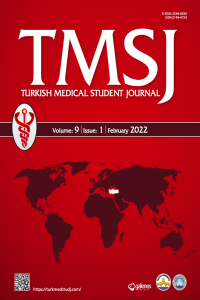EVALUATING THE EFFECTS OF NIGHT SHIFTS ON ATTENTION AND EXECUTIVE FUNCTION OF TRAKYA UNIVERSITY RESIDENTS USING THE TOWER OF HANOI TEST
EVALUATING THE EFFECTS OF NIGHT SHIFTS ON ATTENTION AND EXECUTIVE FUNCTION OF TRAKYA UNIVERSITY RESIDENTS USING THE TOWER OF HANOI TEST
Nightshift, attention, Tower of Hanoi test,
___
- 1. Jaradat R, Lahlouh A, Mustafa M. Sleep quality and health related problems of shift work among resident physicians: a cross-sectional study. Sleep Med 2019;66:201-66. 2. Baldwin PJ, Dodd M, Wrate RW. Young doctors’ health-I. How do working conditions affect attitudes, health, and performance? Soc Sci Med 1997;45(1):35-40. 3. Beecham L. Unanimous support for reduction in juniors’ hours. Brit Med J 1989;298:121-3. 4. Gülser N, Öztürk L, Top MŞ et al. The relationship between restless legs syndrome and insomnia for the staff in shift. Archives of Neuropsychiatry 2012;49(4):281-5. 5. Welsh MC, Huizinga M. The development and preliminary validation of the Tower of Hanoi – revised. Assessment 2001;8(2):167-76. 6. Patsenko EG, Altmann EM. How planful is routine behavior? A selective-attention model of performance in the Tower of Hanoi. J Exp Psychol Gen 2010;139(1):95–116. 7. Reser JE. Chronic stress, cortical plasticity and neurocology. Behavioural Processes 2016;129:105-15. 8. Poulton EC, Hunt GM, Carpenter A et al. The performance of junior hospital doctors following reduced sleep and long hours of work. Ergonomics 1978;21(4):279-95. 9. Goel V, Grafman J. Are the frontal lobes implicated in “planning” functions? Interpreting data form the Tower of Hanoi. Neuropsychologia 1995;33(5):623-42. 10. Wilkinson RT, Tyler PD, Varey CA. Duty hours of young hospital doctors: Effects on the quality of work. J Occup Psychol 1975;48:219- 29. 11. Lingenfelser TH, Kaschel R, Weber A et al. Young hospital doctors after night duty: their task-specific cognitive status and emotional condition. Medical Education 1994;28:566-72. 12. Campos MW, Serebrisky D, Castaldelli-Maia JM. Smoking and cognition. Curr Drug Abuse Rev 2016;9(2):76-9. 13. Ullrich S, de Vries YC, Kühn S et al. Feeling smart: effects of caffeine and glucose on cognition, mood and self-judgment. Physiol Behav 2015;151:629-37. 14. Buchvold HV, Pallesen S, Øyane NMF et al. Associations between night work and BMI, alcohol, smoking, caffeine and exercise – a cross sectional study. BMC Public Health 2015;15:1112. 15. Weintraub S, Mesulam M. Right cerebral dominance in spatial attention: Further evidence based on ipsilateral neglect. Arch Neurol 1987;44(6):621-5. 16. Chaudhary S, Narkeesh A, Gupta N. A study of cognition in relation with hand dominance. Journal of Exercise Science and Physiotherapy 2009;5(1):20-3. 17. Leana MZ. Üstün zekalı ve normal çocuklarda yönetsel fonksiyonlar: Londra Kulesi testi (dissertation). Istanbul: Istanbul Univ. 2005.
- ISSN: 2148-4724
- Başlangıç: 2014
- Yayıncı: Trakya Üniversitesi
THE IMPACT OF OPEN INGUINAL HERNIA MESH REPAIR ON QUALITY OF LIFE
Elif CENGİZ, Toprak Kağan AKSU, Hilal Sena ÇİFCİBAŞI, Tuğrul DEMİREL
Gonca AKSU, Sercan SARAN, Mahmut Sami OFLAZ, Mert ÇİFTDEMİR
CLINICOPATHOLOGICAL FEATURES OF MYELOID SARCOMA PATIENTS FROM A SINGLE CENTER EXPERIENCE
Fatih Erkan AKAY, Hakkı Onur KIRKIZLAR, Elif MERCAN, Fulya ÖZ PUYAN
CANNABINOID RECEPTORS ARE NOT INVOLVED IN ANTINOCICEPTION INDUCED BY SYSTEMIC DICLOFENAC IN MICE
Beiza CHATZİSALİ, Tolga GAŞ, Hilmi KILGIN, Kübra Duvan AYDEMİR, Dilşat ERÜMİT, Ruhan Deniz TOPUZ, Ahmet ULUGÖL
Irmak İrem ÖZYİĞİT, Alperen Taha CERTEL, Begüm SÖYLEYİCİ, Sezgin KEHAYA
ARROW CAUSE OF ANGINA PECTORIS: SINGLE CORONARY ARTERY ANOMALY IN ELDERLY PATIENT
IL-17/TNF-α BISPECIFIC ANTIBODIES AS NEW THERAPEUTIC APPROACH TO RHEUMATOID ARTHRITIS
